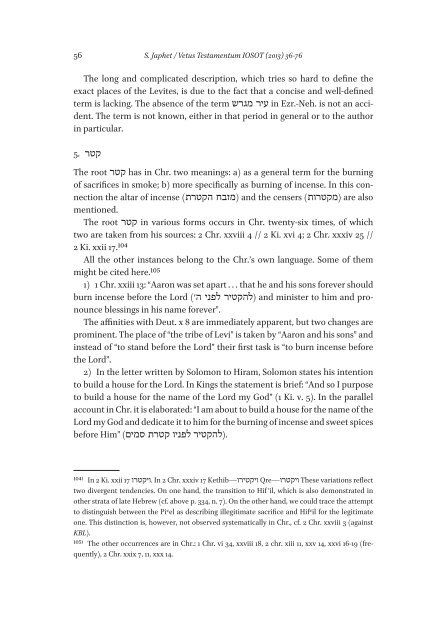Special Issue IOSOT 2013 - Books and Journals
Special Issue IOSOT 2013 - Books and Journals
Special Issue IOSOT 2013 - Books and Journals
Create successful ePaper yourself
Turn your PDF publications into a flip-book with our unique Google optimized e-Paper software.
56 S. Japhet / Vetus Testamentum <strong>IOSOT</strong> (<strong>2013</strong>) 36-76<br />
The long <strong>and</strong> complicated description, which tries so hard to define the<br />
exact places of the Levites, is due to the fact that a concise <strong>and</strong> well-defined<br />
term is lacking. The absence of the term עיר מגרש in Ezr.-Neh. is not an accident.<br />
The term is not known, either in that period in general or to the author<br />
in particular.<br />
קטר .5<br />
The root קטר has in Chr. two meanings: a) as a general term for the burning<br />
of sacrifices in smoke; b) more specifically as burning of incense. In this connection<br />
the altar of incense הקטרת) (מזבח <strong>and</strong> the censers (מקטרות) are also<br />
mentioned.<br />
The root קטר in various forms occurs in Chr. twenty-six times, of which<br />
two are taken from his sources: 2 Chr. xxviii 4 // 2 Ki. xvi 4; 2 Chr. xxxiv 25 //<br />
2 Ki. xxii 17.104<br />
All the other instances belong to the Chr.’s own language. Some of them<br />
might be cited here.105<br />
1) 1 Chr. xxiii 13: “Aaron was set apart . . . that he <strong>and</strong> his sons forever should<br />
burn incense before the Lord לפני ה׳) (להקטיר <strong>and</strong> minister to him <strong>and</strong> pronounce<br />
blessings in his name forever”.<br />
The affinities with Deut. x 8 are immediately apparent, but two changes are<br />
prominent. The place of “the tribe of Levi” is taken by “Aaron <strong>and</strong> his sons” <strong>and</strong><br />
instead of “to st<strong>and</strong> before the Lord” their first task is “to burn incense before<br />
the Lord”.<br />
2) In the letter written by Solomon to Hiram, Solomon states his intention<br />
to build a house for the Lord. In Kings the statement is brief: “And so I purpose<br />
to build a house for the name of the Lord my God” (1 Ki. v. 5). In the parallel<br />
account in Chr. it is elaborated: “I am about to build a house for the name of the<br />
Lord my God <strong>and</strong> dedicate it to him for the burning of incense <strong>and</strong> sweet spices<br />
.(להקטיר לפניו קטרת סמים) Him” before<br />
104) In 2 Ki. xxii 17 .ויקטרו In 2 Chr. xxxiv 17 ויקטירו—Kethib ויקטרו—Qre These variations reflect<br />
two divergent tendencies. On one h<strong>and</strong>, the transition to Hif ʿil, which is also demonstrated in<br />
other strata of late Hebrew (cf. above p. 334, n. 7). On the other h<strong>and</strong>, we could trace the attempt<br />
to distinguish between the Piᶜel as describing illegitimate sacrifice <strong>and</strong> Hifᶜil for the legitimate<br />
one. This distinction is, however, not observed systematically in Chr., cf. 2 Chr. xxviii 3 (against<br />
KBL).<br />
105) The other occurrences are in Chr.: 1 Chr. vi 34, xxviii 18, 2 chr. xiii 11, xxv 14, xxvi 16-19 (frequently),<br />
2 Chr. xxix 7, 11, xxx 14.








![Am HaSefer [Volk des Buches] - Books and Journals](https://img.yumpu.com/20648352/1/174x260/am-hasefer-volk-des-buches-books-and-journals.jpg?quality=85)







